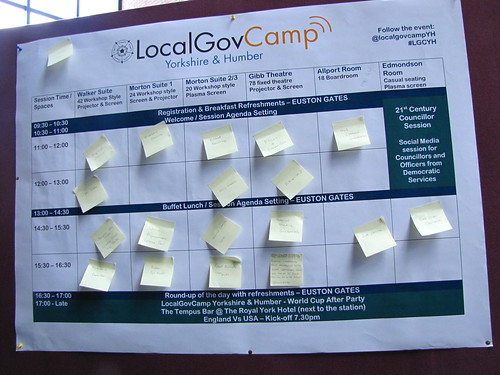Erm, what's an unconference?
I'm sure there's a full definition at Wikipedia but I think of them as being what you'd be left with if you turned the principals of participation on their head and removed keynote speakers and the cost from a traditional conference. There is a venue and there are organisers but the agenda and the structure are pitched over coffee and bacon sandwiches. Some come more prepared than others; the experts can be relied on to bring their insights, others collaborate before the event but equally things just bubble up as the day progresses.

Hold on, you gave up a Saturday during the World Cup to talk about work...are you mad?
I have some sympathy for those who looked at me like I'd lost the plot when I attempted to entice them along and I wonder whether it's hard to see the value if you've never come face to face with the concept in the first place? I'm not sure of the conversion rate but it always seems to find people singing their praises afterwards.
Twitter eavesdropping had given me my exposure to these events as well as connecting to some of the main protagonists but I did get to LocalGovCamp Lincoln where I put real human people to @s and avatars and found the unconference format to be really enjoyable (Andy is talking of hosting another). And Saturday was another opportunity to rub actual shoulders with some of the people pioneering new ideas in local authorities around the country. Unfortunately I didn't manage to collar all those I follow and sadly I was the only person from Hull City Council to make it (obviously I was more irritating than persuasive in my efforts to encourage people to come!)
One of the other disappointments of the day was the absence of the movers and the shakers. I work in a very hierarchical environment and it seems that across the country there's a real disconnect between the influential and the innovative. Of course there are notable exceptions and it's clear that some of the places represented at #lgcyh have achieved significant victories. Their trailblazing can help to further the debate but, for now, those paid to provide leadership in facing down the challenges we face are conspicuous in their absence from the discussions and these events.
In many ways perhaps there was little point in my having gone on Saturday given my role at work. However, from a completely selfish perspective it was fantastic to spend the day surrounded by a group of people who are passionate enough about the work they do and the public they serve to give up a Saturday and travel significant distances to share ideas and talk about the challenges they are overcoming. I took plenty from the four sessions I attended (blogs coming soon) and it was great to meet new people as well as those I already knew.
Last week saw the start of the formal process of the Graduate Scheme coming to an end. When I applied for this job I was excited by the hope of transformation that shone through the city's rhetoric. That excitement has been dulled by the discovery that much of it was just words and the apparent lack of value or strategic thought given to our futures. However, it's great to know that elsewhere in the region real value is placed on innovation and that there's a real ambition to transform public services.
An event like #lgcyh fits snugly with the excellent parts of the Graduate Scheme. Our flitting from service to service has offered a wide experience of local government. Our studying in Birmingham has exposed us to new ideas and encouraged us to explore innovation on an equal footing to men and women with varied experience and varied responsibility. Saturday was an opportunity for the story of local government to be told from a variety of angles and provide a fertile environment for new ideas. It was inspiring, exciting and challenging.
Huge thanks to Ken Eastwood, Kev Campbell-Wright and Melanie Reed who were the ringleaders in organising the day and kudos too to the National Railway Museum which was a cracking venue and put on a good spread (I judge most things on the quality of the cake).
Picture credits:
'The Programme' by London Looks (@ingridk)